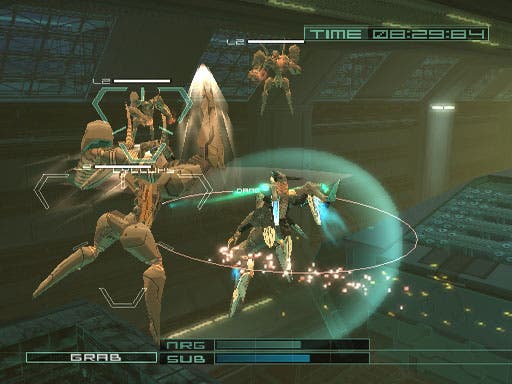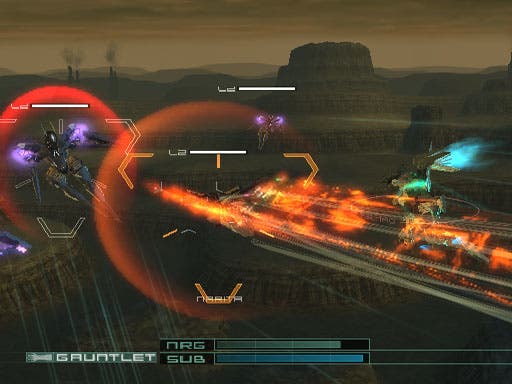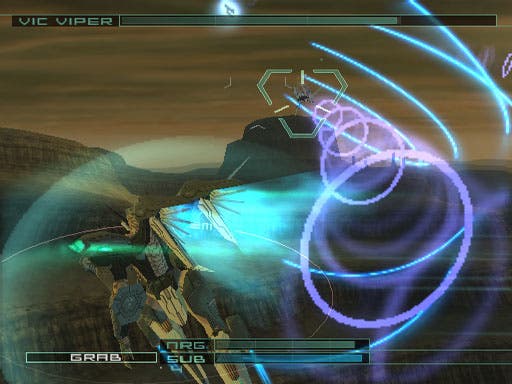Zone of the Enders: The 2nd Runner
Hideo Kojima returns with his pet project, and he's brought some cut-scenes!
The original Zone of the Enders has a somewhat unfortunate reputation as a game which a great many people bought without ever really planning to play it. Despite the merits of the game - a fast and fun, if vaguely mindless, mech combat game rescued from mediocrity by an interesting plot and great design work - it was always likely to be overshadowed by the other goodie you got in the box, namely a free demo of Metal Gear Solid 2. However, Zone of the Enders built up enough of a reputation to spawn a couple of animated episodes expanding upon the story and a pretty decent GBA turn-based strategy title, so given the pretty unresolved plot of the first game (not to mention the fact that this is very much Hideo Kojima's pet project), a second PS2 outing was always on the cards.
Zone of the Enders Reloaded

The Second Runner picks up roughly where the first game left off in plot terms, and will for the most part be instantly familiar to veterans of the original title. After a short introduction sequence in which you pilot possibly the most rubbish mech in the history of mech games (an attempt to gently ease you into the fairly complex twin stick navigation system), you find yourself in the cockpit of the powerful orbital frame, Jehuty, blasting your way through swarms of enemies and dispatching them all with your beam sword, homing lasers and, most importantly, superior sense of style.
The pace of the game is rather different to the original ZoE, however - the central character this time is a gruff ex-soldier called Dingo who isn't particularly keen on this whole hero business (he's the "Second Runner" of the title - the first runner being the rather scared kid Leo Stenbuck in the original game), and in keeping with his personality, the plot doesn't faff around much. Within minutes of starting you're on your way to the war-torn surface of Mars, having had your arse thoroughly kicked by Jehuty's evil twin orbital frame, Anubis - and it's from there on that the game really comes into its own, as the plot develops in typical melodramatic style.
The original Zone of the Enders suffered from one massive problem which blighted the game throughout - namely, lack of variety. That's not an accusation which can be levelled at Second Runner, however. Although early levels of the game feel very similar to the first game - multiple waves of similar enemies being battered senseless by the incredibly powerful Jehuty - there's a whole range of interesting new stuff being introduced. Your frame can now pick up bits of the scenery and batter enemies around the place with them, and better yet, you can pick up enemies and beat other enemies into submission with them, or simply throw them across a level and smash them into a building. You also pick up a bewildering array of new weapons and abilities from early on in the game, which build up to a fairly comprehensive arsenal of battle options.
The Spice of Life

You'll need all of them, too, because Second Runner also doesn't skimp on tricky boss encounters and impressive special stages. Unlike the first game, where most bosses were simply a matter of dodging a lot and fighting a war of attrition, Second Runner's bosses - ranging from the giant mobile armours familiar from the first game to other orbital frames and even gigantic spacecraft - often require a specific trick to be defeated. Your onboard computer, ADA, will often help you with hints about what to do, but working out how to defeat bosses is a satisfying task in itself.
Most of all, though, the special stages in the game deserve commendation - with two in particular sticking in the mind as some of the most impressive levels we've seen in any game in recent years. The first of these involves Jehuty, newly armed with a stunningly powerful cannon that takes several seconds to set up and fire, taking on an entire fleet of space battleships - hopping from one to the next in the midst of withering fire, and standing on their decks to pound their engines with fire while listening to the panicked radio broadcasts of their captains. The second is a gigantic Dynasty Warriors-style romp as you rally the Martian resistance in a desperate assault against vastly overpowering enemy forces, and rush across the battlefield supporting your lines against waves of hundreds of enemies and trying to ensure that as many of your men as possible survive. Frantic, dramatic, and really rather stunning.
The Soul of Wit?

Indeed, this brings us to our primary problem with Second Runner - there simply isn't enough of it. As you might expect from a game with Hideo Kojima at the helm, there's plenty of well-directed cut-scenes in there (all done with the stunning in-game engine apart from the character cut-scenes, which are done with traditional 2D cel animation and look great) and a lot of dialogue and exposition, most of it very well written (we really didn't expect the lump that appeared in our throats when an old friend of ADAs turns up...) - however, even given this, the game is incredibly short. First time through, we finished it in well under six hours.
Thankfully, there's a fair bit of replay value in there; you can play through the game again with Jehuty fully kitted out, and the harder difficulty levels offer a serious challenge. There are also a set of VR Mission-style stages to play through, which should consume plenty of time - but all in all we'd be surprised if a decently skilful gamer could squeeze fifteen hours out of the game. The plot is definitely worth following through, and the gameplay is fantastic - not to mention the graphics, which build on the strengths of the MGS2 engine and really push the PS2 in places - but in longevity terms, this one makes Kojima's MGS games look like epics of biblical proportions.
Europe? Where's that on the map, then?
Ultimately, it's great to see Zone of the Enders back with a sequel that fixes the vast majority of the problems with the first game. The level of variety in terms of basic combat, bosses and levels is fantastic, the plot and dialogue is great, the controls feel very natural once you get used to them, and the whole game looks superb. Really, our only complaint is the brevity of the whole affair - oh, and the fact that it's not out over here until September, despite being released in Japan at the start of the year and in the USA in April. We'll bring you a full review of the PAL version as soon as we get our hands on it - for now, pop this one on your wanted list.

